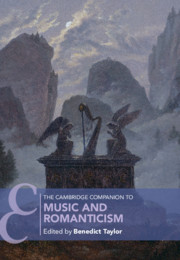Book contents
- The Cambridge Companion to Music and Romanticism
- Cambridge Companions to Music
- The Cambridge Companion to Music and Romanticism
- Copyright page
- Contents
- Figures
- Tables
- Musical Examples
- Contributors
- Preface
- Chronology
- Part I Horizons
- Part II Worlds
- Part III Aesthetics
- 10 Music in Early German Romantic Philosophy
- 11 Meaning and Value in Romantic Musical Aesthetics
- 12 Music and Romantic Interiority
- 13 Music, Expression, and the Aesthetics of Authenticity
- Part IV Practices
- Part V Histories
- Select Bibliography
- Index
- References
10 - Music in Early German Romantic Philosophy
from Part III - Aesthetics
Published online by Cambridge University Press: 06 August 2021
- The Cambridge Companion to Music and Romanticism
- Cambridge Companions to Music
- The Cambridge Companion to Music and Romanticism
- Copyright page
- Contents
- Figures
- Tables
- Musical Examples
- Contributors
- Preface
- Chronology
- Part I Horizons
- Part II Worlds
- Part III Aesthetics
- 10 Music in Early German Romantic Philosophy
- 11 Meaning and Value in Romantic Musical Aesthetics
- 12 Music and Romantic Interiority
- 13 Music, Expression, and the Aesthetics of Authenticity
- Part IV Practices
- Part V Histories
- Select Bibliography
- Index
- References
Summary
This chapter examines the nature and the origins of what it identifies as a distinctively Romantic view of music. According to this, the purpose of music is to provide non-linguistic knowledge or insight, most usually into one’s inner self or, especially, into the fundamental nature of reality. The chapter starts by charting some key moments in the philosophical background of the 1780s and ’90s. Building on this, it traces the emergence of the Romantic view of music in the works of the two philosophers most closely involved in its earliest formulations: Friedrich Schlegel and Georg Friedrich Philipp von Hardenberg (better known by his pen name Novalis). It concludes with brief examinations of the ways in which this view was elaborated by two now-canonical philosophers of this era, Friedrich Schelling and Arthur Schopenhauer, and with a reflection on the subsequent influence of this view.
Keywords
- Type
- Chapter
- Information
- The Cambridge Companion to Music and Romanticism , pp. 165 - 182Publisher: Cambridge University PressPrint publication year: 2021

